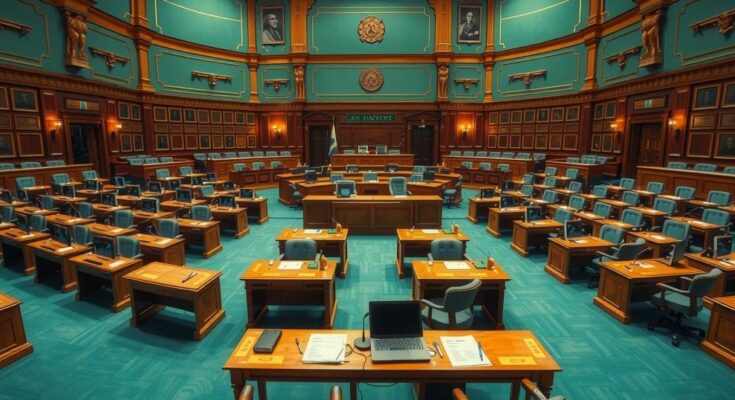Argentina’s Congress approved a decree allowing the government to negotiate with the IMF, a step critical for addressing the country’s financial issues. The approval followed a divided vote in the Chamber of Deputies, with 129 in favor and 108 against. President Milei’s administration argues that a new deal is essential for stabilizing the economy and alleviating capital restrictions. However, Milei faces significant challenges, including rising poverty and protests against austerity measures.
On Wednesday, Argentina’s lower house, the Chamber of Deputies, approved a decree that permits the government to commence negotiations with the International Monetary Fund (IMF). This approval is a significant step towards the new IMF program required to stabilize the country’s finances. The vote was divided: 129 members supported the decree, 108 opposed, and six abstained.
This new deal is essential for Argentina, which is currently facing negative net foreign currency reserves due to years of overspending and recurrent defaults. The country, already the largest borrower from the IMF with a history of 22 loan agreements, is still repaying a $44 billion plan established in 2022.
President Javier Milei’s administration argues that an agreement with the IMF is necessary to strengthen the central bank’s fiscal standing and gradually lift capital controls imposed since 2019, which they believe hinder economic progress and investment opportunities. Although Milei’s libertarian party holds a minor representation in Congress, he has successfully garnered support from conservative and moderate factions to further his agenda.
Following the decree’s passage, President Milei, alongside his sister and Economy Minister Luis Caputo, celebrated on social media. The market responded positively, with the local index rising 4.5% and bonds increasing in value during after-hours trading.
Moderate Peronist lawmaker Miguel Pichetto expressed a cautiously supportive stance, stating, “I support this, though with a critical eye”. He acknowledged his reservations concerning the decree’s lack of detailed explanation but emphasized the need to prioritize Argentina’s stability.
Milei, who won a surprising election in 2023 on an anti-crisis platform, has achieved some economic stabilization, reducing inflation and addressing fiscal deficits. Nonetheless, his austerity measures have led to rising poverty rates and sparked protests, particularly from pensioners affected by economic policy changes. Protests were anticipated to escalate, especially following recent violent incidents during retiree demonstrations.
In conclusion, the approval by Argentina’s Congress for the government to initiate discussions with the IMF represents a crucial milestone in addressing the country’s economic challenges. The necessity for a new agreement stems from Argentina’s deteriorating fiscal situation and aim to eliminate capital controls. While the passage has garnered mixed reactions among lawmakers, there are hopes that it may pave the way for economic recovery amidst ongoing social unrest due to austerity measures.
Original Source: www.straitstimes.com




